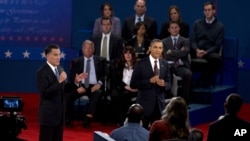BEIJING —
Chinese economic policies came under criticism during Tuesday’s U.S. presidential debate. Both candidates used the country as a target of rebuke and as a tool to attack one another, which drew a mild response from Beijing.
While most of the second U.S. presidential debate focused on domestic issues, President Barack Obama and challenger Governor Mitt Romney gave ample attention to China. The two expressed concerns about its currency policies, trade, and how the world’s second-largest economy figured in their pension plans.
Mitt Romney pledged to take a tougher approach to China if elected.
"China has been a currency manipulator for years and years and years," he said. "And the president has a regular opportunity to label them as a currency manipulator, but refuses to do so. On day one, I will label China a currency manipulator, which will allow me as president to be able to put in place, if necessary, tariffs where I believe that they are taking unfair advantage of our manufacturers."
But President Obama argued his administration’s approach was producing results.
"As far as currency manipulation, the currency has actually gone up 11 percent since I have been president because we have pushed them hard. And we have put unprecedented trade pressure on China," said President Obama. "That is why exports have significantly increased under my presidency. That is going to help to create jobs here."
Despite the sometimes harsh criticism that came during the debate, at his briefing in Beijing, Foreign Ministry spokesman Hong Lei’s response was low-key. When asked about the criticism and negative perception of China in America, Hong Lei focused on the opportunity China’s development provides both countries.
Hong Lei said that China hopes politicians in both the Democratic and Republican Party in the United States can view China's developments in a fair and objective manner, and actively support the growth of China-U.S. relations. He also said China hopes the candidates can recognize the mutually beneficial nature of China-U.S. business relations.
Hong Lei flatly denied China manipulates its currency, adding he hoped that after the elections the U.S. candidates would do more to enhance trust between the two countries.
But there are new indications of waning trust between the United States and China, following a series of policy standoffs over such issues as trade practices, China's human rights record, and the so-called U.S. strategic “pivot” toward Asia. A newly released survey by the Pew Research Center indicates reservations about relations with the United States are growing among the Chinese public.
The survey reports that approval ratings for the United States and President Obama have declined significantly and the percentage of Chinese who characterize their country’s relationship with America as one of cooperation has plummeted from 68 percent to 39 percent.
While most of the second U.S. presidential debate focused on domestic issues, President Barack Obama and challenger Governor Mitt Romney gave ample attention to China. The two expressed concerns about its currency policies, trade, and how the world’s second-largest economy figured in their pension plans.
Mitt Romney pledged to take a tougher approach to China if elected.
"China has been a currency manipulator for years and years and years," he said. "And the president has a regular opportunity to label them as a currency manipulator, but refuses to do so. On day one, I will label China a currency manipulator, which will allow me as president to be able to put in place, if necessary, tariffs where I believe that they are taking unfair advantage of our manufacturers."
But President Obama argued his administration’s approach was producing results.
"As far as currency manipulation, the currency has actually gone up 11 percent since I have been president because we have pushed them hard. And we have put unprecedented trade pressure on China," said President Obama. "That is why exports have significantly increased under my presidency. That is going to help to create jobs here."
Despite the sometimes harsh criticism that came during the debate, at his briefing in Beijing, Foreign Ministry spokesman Hong Lei’s response was low-key. When asked about the criticism and negative perception of China in America, Hong Lei focused on the opportunity China’s development provides both countries.
Hong Lei said that China hopes politicians in both the Democratic and Republican Party in the United States can view China's developments in a fair and objective manner, and actively support the growth of China-U.S. relations. He also said China hopes the candidates can recognize the mutually beneficial nature of China-U.S. business relations.
Hong Lei flatly denied China manipulates its currency, adding he hoped that after the elections the U.S. candidates would do more to enhance trust between the two countries.
But there are new indications of waning trust between the United States and China, following a series of policy standoffs over such issues as trade practices, China's human rights record, and the so-called U.S. strategic “pivot” toward Asia. A newly released survey by the Pew Research Center indicates reservations about relations with the United States are growing among the Chinese public.
The survey reports that approval ratings for the United States and President Obama have declined significantly and the percentage of Chinese who characterize their country’s relationship with America as one of cooperation has plummeted from 68 percent to 39 percent.




